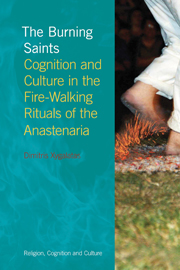Book contents
- Frontmatter
- Dedication
- Contents
- List of illustrations
- Acknowledgements
- 1 Introduction
- 2 Tradition in the making
- 3 The ethnographic setting
- 4 Fire-walking in Agia Eleni
- 5 Knowledge and revelation among the Anastenaria
- 6 Ritual and mind
- 7 Costly rituals
- 8 Arousal, emotion and motivation
- 9 The physiology of high-arousal rituals
- 10 Putting it all together
- Notes
- Bibliography
- Index
5 - Knowledge and revelation among the Anastenaria
- Frontmatter
- Dedication
- Contents
- List of illustrations
- Acknowledgements
- 1 Introduction
- 2 Tradition in the making
- 3 The ethnographic setting
- 4 Fire-walking in Agia Eleni
- 5 Knowledge and revelation among the Anastenaria
- 6 Ritual and mind
- 7 Costly rituals
- 8 Arousal, emotion and motivation
- 9 The physiology of high-arousal rituals
- 10 Putting it all together
- Notes
- Bibliography
- Index
Summary
Very often I hear my husband talking in his sleep. Sometimes I ask him what he is talking about, and he just says, “Turn around and sleep; those are my own things.” I understand. He is talking to the Saint.
(Personal interview with the wife of a senior Anastenaris)The tradition of the Anastenaria is believed to contain a special form of knowledge. Although the content of this knowledge is not specified, seniors are believed to possess larger portions of it, while the younger Anastenaria usually consider themselves ignorant of the Saint's will. For this reason, the elders are seen as authoritative and are often consulted on matters concerning the tradition, important decisions, human relations, personal problems and everyday matters in general. I have very often heard the elders tell the youths – insiders and outsiders – including me, “You may have read many books and gone to university, but I know things about which you have no idea.” This wisdom is considered to be hard to acquire, and there is no official or direct process for its transmission. Ritual procedures are learnt through participation and observation, but there is no formal teaching of religious ideas and principles. In fact, even when explicitly asked by younger members of the community about this religious knowledge, the elders are usually cryptic and evasive.
- Type
- Chapter
- Information
- The Burning SaintsCognition and Culture in the Fire-Walking Rituals of the Anastenaria, pp. 91 - 106Publisher: Acumen PublishingPrint publication year: 2012



